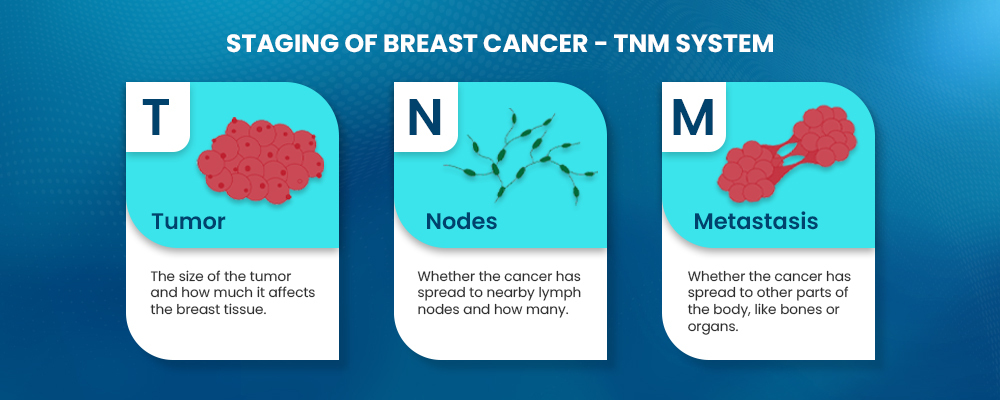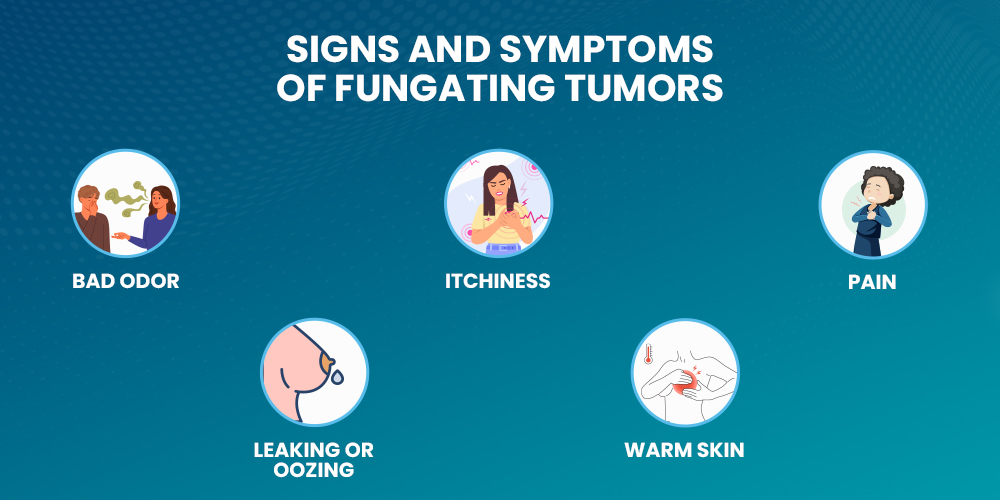
Breast cancer is one of the most common cancers affecting women worldwide, characterized by the abnormal growth of cells in the breast tissue. It can range from localized cases that are easier to treat to advanced stages that spread to other body parts. Early detection and timely treatment significantly improve outcomes. However, in advanced cases, complications like phyllodes breast tumor or fungating breast cancer can arise, requiring urgent medical attention to manage symptoms and enhance the quality of life.
What is Fungating Breast Cancer?
Fungating breast cancer is a very serious form of breast cancer that occurs when the tumor grows through the skin. This growth leads to the formation of an open wound or ulcer on the breast. The wound can leak fluids, emit a strong odor, and cause pain. This condition typically appears in the later stages of breast cancer, not as a separate type. It happens when the cancer has spread and grown deeply enough to break through the skin.
It is important to note that fungating breast cancer is not a different kind of breast cancer, but rather a late-stage complication of it. Around 2-5% of advanced breast cancer cases may develop into fungating tumors. If a person notices a wound, ulcer, or infection on the skin of the breast, it’s crucial to seek medical help right away. Early treatment can help manage the symptoms and prevent further complications.
Causes and Risk Factors of Fungating Breast Cancer
While the exact causes of fungating breast cancer are still not fully understood, certain factors can increase the risk of developing this severe condition.
- Females over the age of 50,
- Women who are overweight or obese,
- Individuals with a family history of breast cancer are more likely to develop breast cancer.
Additionally, people with genetic mutations, like BRCA1 and BRCA2.
Those who have had previous hormones or radiation therapy are also at higher risk.
Although there is no way to predict who will develop fungating breast cancer specifically, larger breast tumors can increase the risk.
As the tumor grows, it can break through the skin and form an ulcer, which is often a characteristic sign of a fungating breast tumor.
In some cases, the tumor grows unnoticed until it causes an ulceration.
However, when left untreated for an extended period, the tumor can grow large enough to resemble a fungating breast wound.
Staging of Breast Cancer
When doctors stage breast cancer, they often use the TNM system. This system helps determine how far cancer has spread. “TNM” stands for:
- Tumor (T): The size of the tumor and how much it affects the breast tissue.
- Nodes (N): Whether the cancer has spread to nearby lymph nodes and how many.
- Metastasis (M): Whether the cancer has spread to other parts of the body, like bones or organs, is known as metastasis. When it spreads to the bones specifically, it is called bone metastasis.
The TNM staging system ranks breast cancer from Stage 0 to Stage 4. The lower the number, the less the cancer has spread. A higher number indicates more advanced breast cancer.

What Stage is Fungating Breast Cancer?
Fungating tumors are most commonly seen in the advanced stages of breast cancer, such as Stage 3 or Stage 4. These stages indicate that the cancer has spread and is more challenging to treat. However, there can be exceptions where smaller tumors cause ulceration or wounds.
In Stage 3, the cancer is larger and may involve multiple lymph nodes or invade the chest wall or skin around the breast. Despite its spread, the cancer has not yet reached distant organs like the liver or lungs.
In Stage 4, the cancer has spread to other parts of the body, such as the bones, brain, liver, or lungs. This stage is known as metastatic or advanced breast cancer. At this point, the cancer moves through the lymphatic system or bloodstream to distant areas, making treatment more complex.
How serious is stage 4 breast cancer?
Stage 4 breast cancer is very serious, with only 22% of people surviving five years. On average, survival is about three years.
Is Fungating Breast Cancer Terminal?
When breast cancer grows and eventually breaks through the skin, it forms what’s known as fungating breast cancer. This stage can look alarming and feel painful, so it’s natural for people to wonder and ask, “Is fungating breast cancer terminal?” In many cases, the answer is not always yes.
Although it often develops in advanced stages, it doesn’t always mean that life is ending soon. With proper treatment, consistent wound care, and strong medical support, many patients continue to live comfortably for months or even years. Therefore, the main focus shifts toward managing symptoms, easing pain, and improving overall quality of life.
Signs and Symptoms of Fungating Tumors
Fungating or ulcerating tumors can cause several noticeable and distressing symptoms, in addition to those caused by the underlying cancer.
Some of the most common symptoms of fungating breast cancer include:
- Bad odor: The tumor can emit a strong, unpleasant smell due to infection or tissue breakdown.
- Leaking or oozing: The wound may release fluids, sometimes with blood or pus.
- Itchiness: In addition, the skin around the tumor may feel itchy, adding to the discomfort.
- Pain: These tumors can cause persistent pain that may worsen over time.
- Warm skin: Moreover, the affected area might feel warm to the touch, indicating inflammation or infection.

If you notice any of these symptoms, particularly alongside an infection on the skin of the breast, seek medical attention immediately. Early management of a fungating tumor can help reduce discomfort and prevent further complications.
Treatments for Fungating Breast Tumors
When a breast tumor breaks through the skin, treatment focuses on managing the tumor, relieving pain, and caring for the wound. Emotional and social support also play an essential role in improving quality of life. Treatment plans often depend on whether the cancer is localized or has spread to other parts of the body.
Localized Cancer Treatments
For localized fungating tumors, a combination of surgery, radiation therapy, and chemotherapy is often recommended:
- Surgery: Removing the tumor is usually the primary treatment to eliminate the cancerous mass.
- Radiation Therapy: Often recommended after surgery to reduce the risk of recurrence.
- Chemotherapy and Hormone-Blocking Therapy: These may be used before surgery to shrink the tumor, making the operation less invasive.
Advanced or Metastatic Cancer Treatments
For advanced or metastatic cancer, treatment prioritizes symptom management and quality of life through palliative care. This includes pain relief, emotional support, and improving daily comfort.
Symptom Management
Wound Care
Proper care for a fungating breast wound is vital to prevent infection, reduce leakage, and manage pain.
- Doctors provide specific instructions for cleaning and dressing wounds.
- Barrier creams can protect the surrounding skin from irritation caused by leakage.
- Furthermore, special dressings that form a gel upon contact with blood help control bleeding.
Managing Odor
Unpleasant smells from a fungating tumor can cause emotional distress. Strategies to manage odor include:
- Using dressings designed to neutralize odors.
- Applying antibiotic ointments to prevent infection.
- Using odor-neutralizing sprays or fresh scents to mask the smell.
Pain Relief
Pain can stem from both the tumor and the dressing materials.
- Switching to gentler adhesives or materials may help if dressings cause pain.
- Moreover, for tumor-related pain, doctors may recommend safe and effective long-term pain medications.
Itchiness
Itchy skin around the wound is a common symptom of ulcerating cancers and can be managed with:
- Oral or topical antihistamines.
- Topical steroids.
- Calamine lotion for soothing relief.
By combining medical treatments with wound care and symptom management, individuals with fungating breast tumors can enhance their comfort and overall well-being.
Read More: Metaplastic Breast Cancer: Symptoms, Treatment, and What’s Next
Exploring Derma Clinical Studies
Derma clinical studies are essential for advancing skin health treatments, offering participants access to innovative therapies while contributing to medical research. These studies evaluate the safety and effectiveness of new skin treatments, aiming to improve the quality of life for individuals with various skin conditions.
Effective clinical trial recruitment ensures diverse participation, helping researchers gather valuable data for comprehensive analysis. Patients involved in such studies not only gain early access to cutting-edge treatments but also play a crucial role in shaping future dermatological care.
For patients with advanced cancers, participation in metastatic breast cancer clinical trials provides support and access to groundbreaking therapies. By exploring innovative approaches, these trials aim to redefine treatment standards and improve patient outcomes.
Also Read: How I Knew I Had Inflammatory Breast Cancer
Conclusion
Fungating breast cancer is a severe complication of advanced breast cancer that requires immediate medical attention to manage symptoms and improve quality of life. While it primarily occurs in the later stages, recognizing its signs, such as ulcers, odor, or persistent pain, can prompt timely care. Treatments like surgery, radiation, chemotherapy, and symptom management are crucial for addressing both localized and metastatic cases. If you or a loved one faces fungating breast cancer or metastatic breast cancer, prompt consultation with a healthcare provider ensures access to tailored treatments and supportive care, helping manage the condition effectively.







